This essay is cross-posted from https://thegreymatter.substack.com/p/when-do-we-celebrate
--
Imagine a world where global child mortality has plummeted from 40% to 3.8%. Where most children are vaccinated against deadly diseases. Where extreme poverty has been slashed by two-thirds in just two decades.
Now stop imagining, because that world is our reality.
So... when exactly did we celebrate?
If you're struggling to recall the date, it's because there wasn't one. Part of this is due to the nature of progress. While negative events like natural disasters or pandemics tend to unfold rapidly, positive changes—like the reduction of extreme poverty or improvements in global health—tend to happen gradually over years or decades.
But I think there’s another reason, too. We’ve developed a strange aversion to good news, a collective reluctance to acknowledge progress. We've accomplished feats our ancestors would have considered miracles, yet instead of celebrating, we're more inclined to furrow our brows and say, "Yeah, but what about...?"
We shouldn’t ignore ongoing problems, yet we also shouldn’t confuse “there’s still more work to do” with “everything is getting worse”.
In this post, we'll explore humanity’s remarkable achievements, why we often resist good news, and what we might gain by learning to celebrate our successes.
Winning the War Against Hunger
Let's start with a question that sounds like it should be easy to answer: About how many Americans died of hunger last year?
I’ve spent hours scouring the internet, digging through CDC data, and deciphering ICD-10 codes trying to answer this question. From all of my investigating, it seems that the number of people in the US who die of starvation in the traditional sense—being too impoverished to have food—is zero or very close to it. There are some nuances to this, so I’ll provide more details in the appendix, but the reality is that starvation is virtually non-existent in America today.
It's difficult to overstate the magnitude of this triumph. For hundreds of millions of years, the relentless search for sustenance has driven Earth’s organisms. For 99.9% of human existence, the specter of starvation loomed large, shaping our biology, psychology, and social structures. While the specifics varied across locations and eras, obtaining food was the main activity for our ancestors. And as a group, a long enough string of failures could mean death.
Unusually cold and rainy growing seasons in 1315 and 1316 in Europe caused a famine that killed between 10 and 25% of the population. Even as recently as the 19th century, the Irish Potato Famine claimed a million lives and forced another million to emigrate, reducing the population by 20-25%, a reduction that, to this day, it has never recovered from.
Fast forward to America today, and the transformation is nothing short of miraculous. In a nation of over 330 million people, deaths from starvation have become practically nonexistent.
We've not just reduced hunger—we've fundamentally altered the human condition. For the first time in our species' history, an entire society has broken free from the constant worry of starvation. This isn't just progress; it's a revolutionary leap that our hunter-gatherer ancestors could scarcely have imagined.
But instead of celebrating, it seems the conversation has shifted. We now talk about “food insecurity”. It’s a confusing term because it sounds like hunger but it’s a very different thing. Food insecurity was officially defined by the US Department of Agriculture in two different types:
Low food security: reports of reduced quality, variety, or desirability of diet. Little or no indication of reduced food intake.
Very low food security: reports of multiple indications of disrupted eating patterns and reduced food intake.
To get a sense of what this means, let’s look at an example. A recent study found that nearly 40% of U.S. college students have food insecurity. These are all students wealthy enough to go to college. This is very different from people dying from starvation. In fact, study after study has shown that “food insecurity” is actually about obesity.
Obesity is a real issue, but it's a far cry from the specter of starvation that haunted our ancestors. How did we switch from worrying about starvation to worrying about eating too much without most people noticing? Shouldn’t we have at least thrown a parade first?
Victories Abound
Hunger is just a portion of our unacknowledged progress. Let's look at some national and global statistics that should have us all doing a happy dance:
Extreme poverty has plummeted. 200 years ago nearly everyone on the planet lived in extreme poverty. Since 1950, the percentage of the global population in extreme poverty has dropped from about 62% to less than 10% today, and the absolute number continues to drop every day. That's not just good, it's "start a conga line around the planet" good.
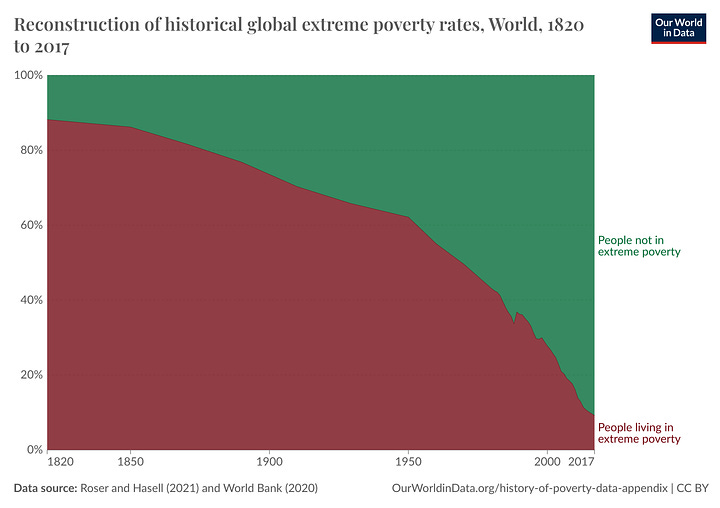
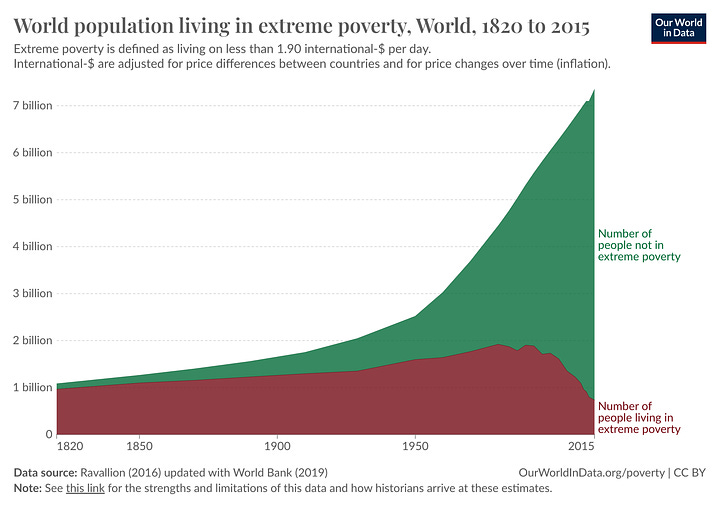
Child mortality has taken a nosedive. In 1800, over 40% of children died before their fifth birthday. Today, that number is 3.8%.
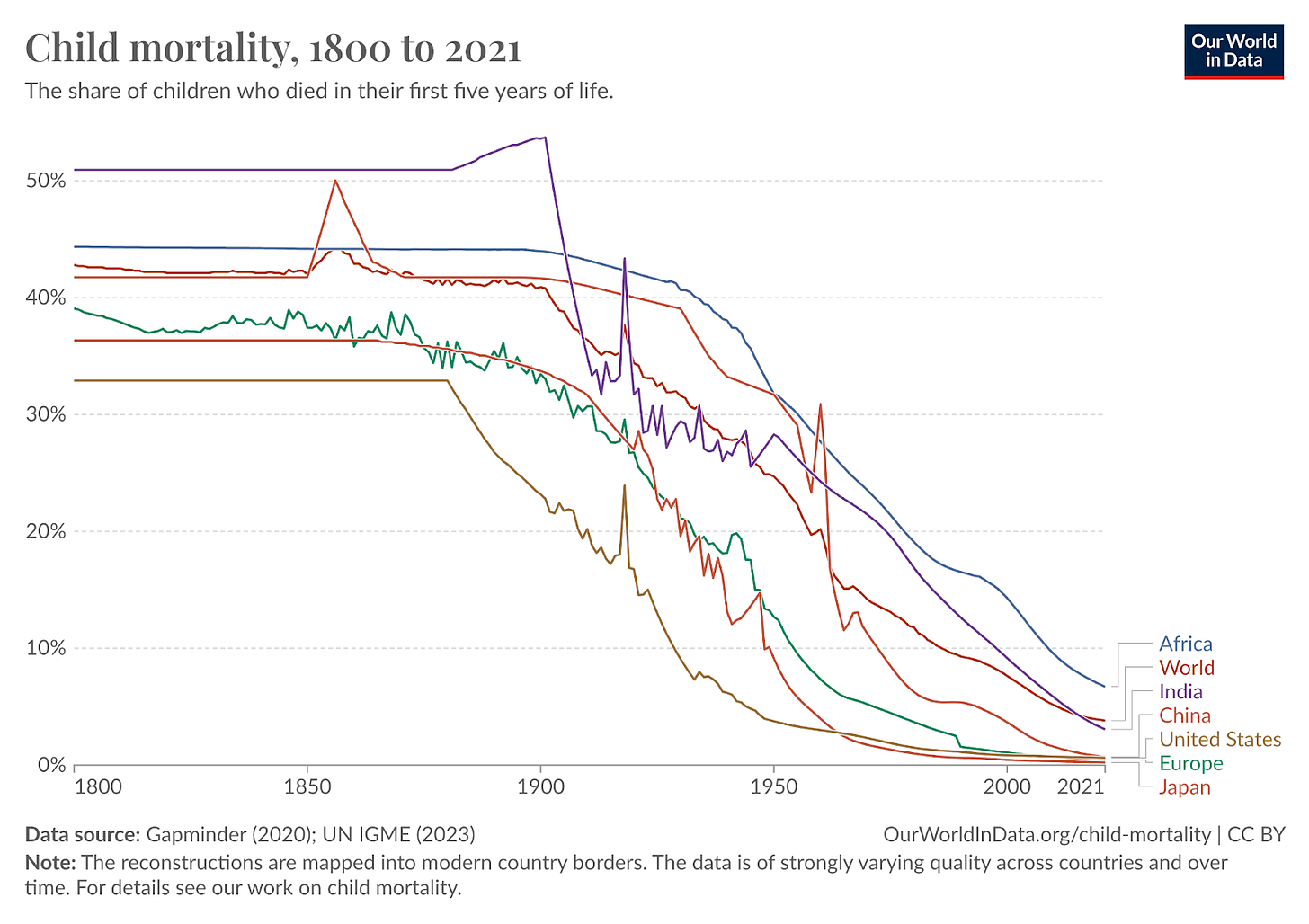
3. Life expectancy has shot up on every corner of the planet.

4. People’s wealth has more than doubled since 1990. This is wild to me because it happened in my lifetime, but I would have never guessed it. The average person worldwide is more than twice as rich now.
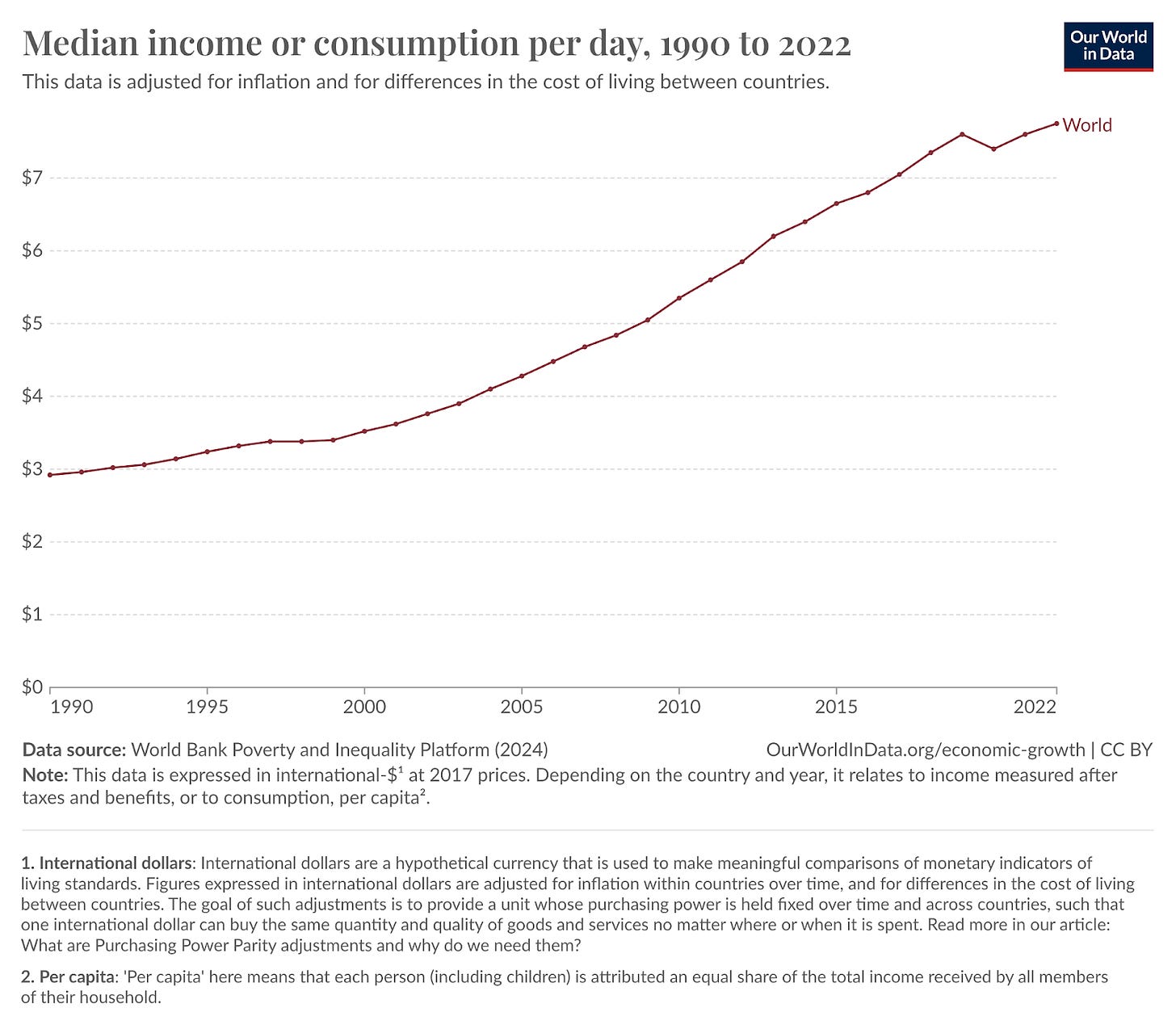
5. Maternal mortality has fallen off a cliff in developed countries and continues to fall worldwide.
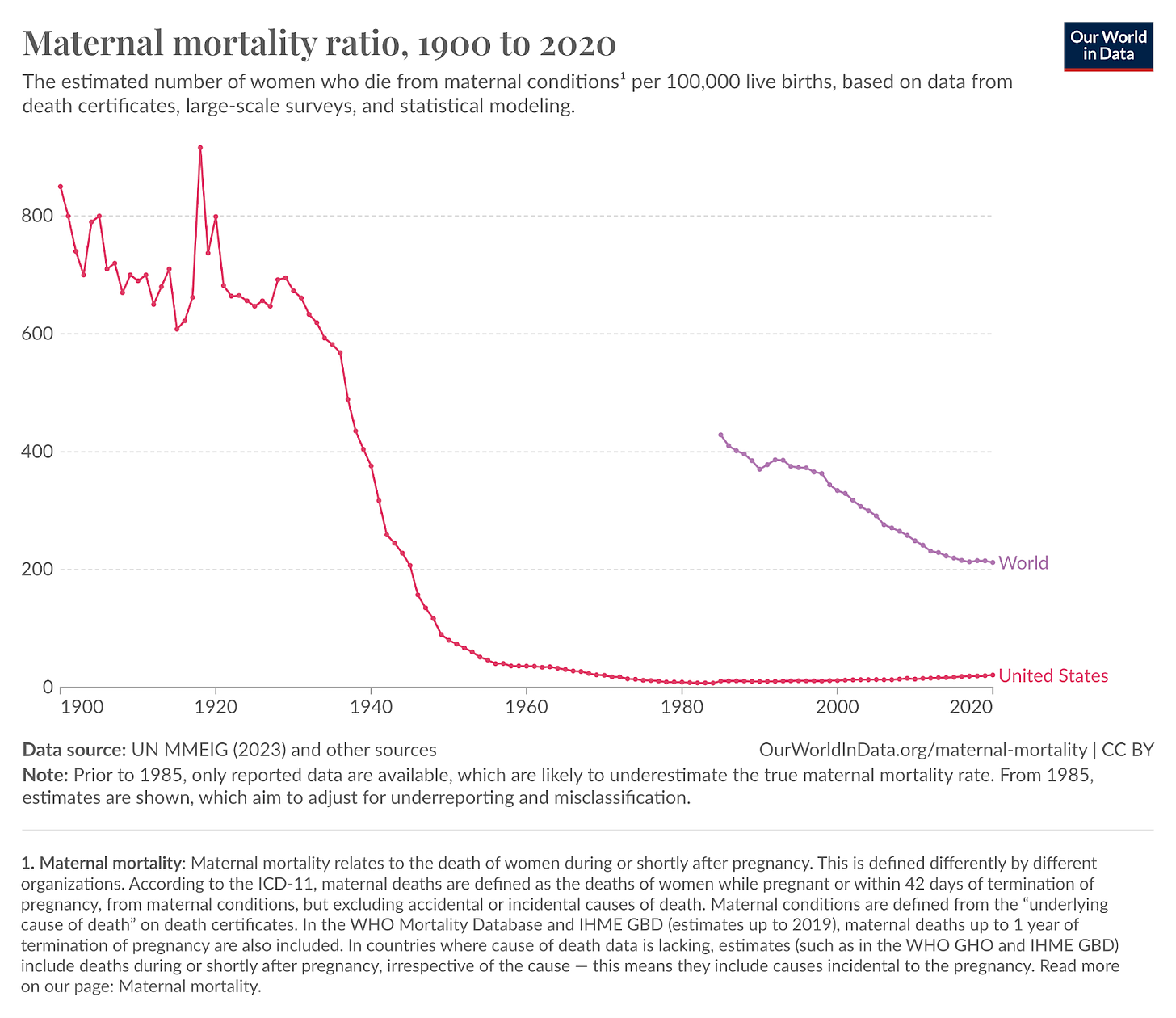
6. In 2010, HIV reduced a person’s lifespan by 13 years. Today, people who start HIV treatment have around the same lifespan as those without HIV.
Of course, none of these facts are meant to imply that the world is perfect. There’s still work to be done. But these achievements should have us popping champagne corks and dancing in the streets. Yet outside small pockets of the internet, these things are rarely discussed.
Why does mentioning these triumphs feel almost... taboo? It seems to reveal a broader societal tension: we've become so accustomed to focusing on problems that acknowledging progress feels almost wrong. Suggesting that people overestimate the amount of hunger makes me feel callous, as if I should expect to be visited by the ghosts of Christmas Past, Present, and Yet to Come.
But it doesn’t come from a place of uncaring. It comes from a belief that we are better off when we know what is true about the world.
The Global Progress Quiz
Philosopher and ethicist Peter Singer, renowned for his work on global poverty and animal welfare, has also taken note of our collective blind spot to progress. He addresses it in his 2009 book, The Life You Can Save. He starts by offering the following quiz:
1. In the last 20 years, the proportion of the world’s population living in extreme poverty has …
a) Almost doubled
b) Remained the same
c) Almost halved
2. How many of the world’s 1-year-old children today have been vaccinated against some disease?
a) 20%
b) 50%
c) 80%
3. Where does the majority of the world’s population live?
a) Low-income countries
b) Middle-income countries
c) High-income countries
If you want, try to make your guesses and then scroll down past AI’s response to my request for “the cutest puppy in the world”.

The answers are:
c) Almost halved
c) 80%
b) Middle-income countries
Singer discusses the results as follows:
According to the World Bank, the proportion of the world’s population living below the Bank’s extreme poverty line fell from 34% in 1993 to 10.7% in 2013. This suggests that it fell by two-thirds, rather than just half, but because extreme poverty is very difficult to measure, the study used a conservative answer. In any case, this dramatic reduction is one of the greatest achievements in the history of our species; yet few people know about it. On average, only 7% got question one right. In the United States the figure is even lower: 19 out of every 20 Americans who took the survey in the United States believed, falsely, either that the proportion of people in extreme poverty rate had not changed over the last 20 years, or that it had greatly increased.
The result is similar for question two, about vaccines. Almost all children are vaccinated in the world today, a phenomenon that the authors of Factfulness [a book that includes a discussion of people’s responses to these questions] rightly label “amazing.” Again, very few people—only 13%—were aware of this important success in protecting the health of children all over the world.
He goes on to say:
In wealthy societies, most poverty is relative. People feel poor because many of the good things they see advertised on television are beyond their budget—but they do have a television. In the United States, 97% of those classified by the Census Bureau as poor own a color TV. Three quarters of them own a car. Three quarters of them have air conditioning. I am not quoting these figures in order to deny that the poor in the United States face genuine difficulties. Nevertheless, for most, these difficulties are of a different order from those of the world’s poorest people.
Peter Singer has been called a lot of things, but “indifferent to the poor” is not one of them. This is a man who has spent his career working to reduce global poverty and suffering and has argued that we have a moral obligation to give away most of our income to help those in extreme poverty. So when Peter Singer says, "Hey, maybe things aren't as apocalyptically terrible as we think," it's worth paying attention.
Resistance to Good News
So we've made incredible progress, but instead of throwing confetti, we're throwing shade. Why?
When Cause and Identity Combine
One reason is that for many government agencies and NGOs, their cause becomes their identity. They conflate their mission with simply sustaining the organization itself.
Acknowledging success could be harmful to the organization. You’ll get a lot more donations from “People are starving! Click here to help” than from “People are overweight! Click here to help.” Though I’m sure the vast majority mean well, they can be poorly incentivized to solve problems, and certainly to publicize that it’s been solved. Success could literally threaten their existence.
As their causes become less and less dire, they obfuscate this information. As I mentioned, I spent quite some time searching for statistics on starvation in the US. It’s easy to find global estimates of deaths from starvation, such as counters and reports readily available on sites like the World Food Program or the UN. But I’ve been all over sites like Feeding America and Meals on Wheels America and I found no mention of it. They are not incentivized to have a death counter sitting at 0, so, instead, they switch to focusing on food insecurity.
I can’t recall a government agency or NGO ever declaring "mission accomplished" and shutting down[1]. More often, I see the goalposts shift as initial goals are met. In this case, it seems we’ve quietly gone from “people aren’t eating enough food” to “people aren’t eating enough nutritious food.”
As much as we'd like to think of government agencies and NGOs as disinterested parties only seeking to advance their mission, they are not immune to self-interest. These organizations have a vested interest in preserving themselves, their budgets, and their perceived relevance (e.g. see this example of Thomas Sowell describing his experience with the Department of Labor). Employees naturally want job security, and institutions fight to maintain or increase their funding year after year. This can create a subtle but powerful incentive to manage problems rather than solve them outright.
This is not a new phenomenon. As Booker T. Washington noted in his 1911 memoir:
I am afraid that there is a certain class of race-problem solvers who don't want the patient to get well, because as long as the disease holds out they have not only an easy means of making a living, but also an easy medium to make themselves prominent before the public.
The Psychology of Pessimism
Although the misaligned incentives are part of the problem, I still think there’s something much deeper at work, almost like something embedded in human nature itself. Is this the “hidden tiger in the bushes problem”—our brains are wired to be overly cautious because in our evolutionary past, missing a real danger (like a tiger in the bushes) was far worse than falsely suspecting one?
I feel this on a personal level. Whenever I hear that the global population is wealthier than I expected, my gut reaction is, "I must argue against this. They must have overlooked something.” If I hear that Americans have more money for food than ever before, I immediately think, “What about inflation? Perhaps grocery prices are climbing faster than income?" But no—I checked and I found that in recent years, Americans are spending a smaller share of their disposable income on food than ever before.
Perhaps there’s a social aspect to this? Consider Peter Singer's quiz. Imagine being asked, on live TV, how many of the world’s 1-year-olds have been vaccinated against diseases. If you guessed 80% and the real answer was 20%, you'd likely be condemned as someone so out of touch and privileged that you can’t see the world's harsh realities. But if you guessed 20% and the true figure was 80%, the consequences wouldn't be nearly as severe.
In fact, people might think you’re especially compassionate. This is interesting if you think about it. You could be shown to be less knowledgeable about these important issues but appear to be more compassionate because of it.
There’s a subtle dynamic at play here. If you guess that only 20% of children are vaccinated, I think people will perceive a hidden implication that you believe the issue of getting more children vaccinated is important, and therefore you are a good person. But if you guess 80%, people perceive that you think the issue is less important, and, somehow, in the inscrutable ways in which the human mind works, you’re a less caring person.
But this is flawed thinking. Guessing 20% when the actual number is 80% doesn’t make you more caring; it just makes you wrong. This is yet another instance of how people tend to implicitly conflate different ideas. They hear what you believe to be true about the world and blend it with what they assume you think is important. But stating that the vaccination rate is 20% or 80% shouldn’t be seen as a declaration of importance—it’s simply a fact, not a reflection of how much you care.
We see this all over. I once wrote a piece suggesting that a scientific study (and the New York Times article that covered it) had unfairly and inaccurately labeled medical examiners as racist. I pointed out that the study combined factors in a way that confounded the issue and provided no evidence that medical examiners were racist. One might hope my progressive friends would be relieved to learn the world was less racist than they feared. But in reality, you know that’s not how they reacted. No one reached out to celebrate, no one said, "Great news! Less racism than we thought!" It’s as if celebrating good news is a betrayal of the cause.
When an article shows that racism exists, we’re quick to update our view of the world and conclude it’s worse than we realized. But when the opposite happens—when evidence shows things are better than we thought—it’s as if we’re reluctant to accept it. It’s like a one-way ratchet that only tightens.
Against Unwarranted Pessimism
I have two main objections to our inclination to overlook progress:
Understanding what’s true about the world is inherently valuable.
Having an accurate model of the world is the best place from which to decide how to improve it. When we ignore what's going well, we risk misallocating resources and falling prey to those who benefit from promoting the narrative that everything is broken.
Recognizing our successes isn’t about becoming complacent—it’s about learning from them. If we've made remarkable progress in reducing global poverty, we should study what worked and see if those strategies can be applied to other issues. If child mortality has dropped dramatically, maybe there are lessons that could help us tackle other health crises. It's not about resting on our laurels; it's about using our achievements as a foundation to reach even greater heights.
Doom mentality is just really bad.
It’s bad for people; it’s bad for the world. Constant doom and gloom can lead to hopelessness and inaction. It leads to depression and anxiety. I don’t think anything good comes from this attitude.
A Toast to Progress
So let's take a moment to recognize—and celebrate—all that we have accomplished in improving the human condition over the past several decades. Here's a toast to human progress.
Is this a utopia? No. In this world, we still have problems. We still have suffering. We still have concerns about the future. But we do all of this with a fundamental understanding that progress is possible because we've seen it happen.
We're clear-eyed about challenges, but we can also be clear-eyed about our capacity to meet them. We don't ignore bad news, and there’s no reason we should ignore good news. We can find a productive balance.
The next time you hear a piece of good news about human progress, resist the urge to immediately counter it with a "Yes, but..." Instead, try a radical new approach: Acknowledge it. Celebrate it. Maybe even share it with others.
Appendix
Two useful sources for searching causes of death are VizHub and the CDC database. The ICD-10 codes for malnutrition are E40-E46. However, T73.0 specifically refers to starvation and X52 denotes a lack of food. In the CDC database, T73.0 and X52 don’t even show up as options.
When you search these databases, you’ll find some deaths from malnutrition, specifically from protein-energy malnutrition. It’s easier to see those data on Our World in Data, specifically the graph here which shows worldwide deaths at the top and U.S. deaths at the bottom. As you’ll see, worldwide deaths are overwhelmingly by those under 5 years old. But in the US, you can’t see any deaths from those under 5 but, instead, are mostly people over 70.
Why are the elderly dying of malnutrition in the US? Is that because they can’t afford to eat? No. According to this study, “Malnutrition is often exacerbated in the residential care setting due to factors including lack of dentition [fancy way of saying they have no teeth] and appetite, and increased prevalence of dementia and dysphagia.” So although some elderly people do indeed die of malnutrition, it’s because they’ve lived so long that other parts of their bodies have broken down (e.g. can’t chew, swallow, or remember to eat) and they can’t consume nutrients.
While technically a form of starvation, this is very different from starvation in the traditional sense where people have nothing to eat, as seen during the Irish Potato Famine.
- ^
There could be examples immediately following WWII that I’m not aware of. For example, The Office of Censorship shut down after the war. I don’t know whether the impetus came from within or if they tried to justify their existence after the war ended.
